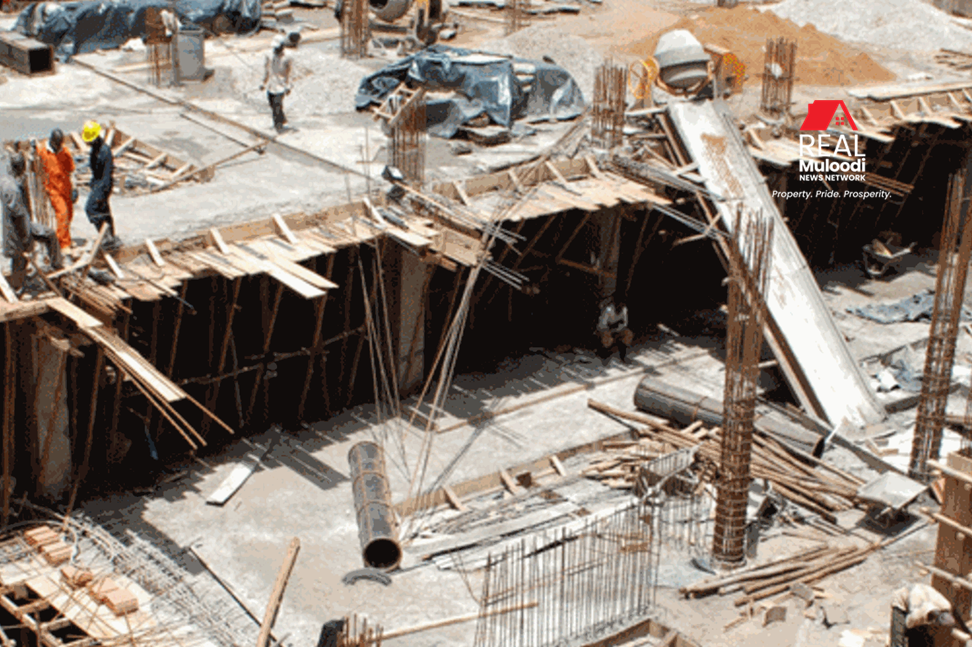UGANDA, Kampala | Real Muloodi News | In Uganda, the construction and building materials sector has been grappling with , leaving many Ugandans struggling to afford housing.
Data from the Uganda Bureau of Statistics (UBOs) reveals that the inflation rate in the construction sector surged by 0.2 per cent in August, compared to a 0.1 per cent increase the previous month.
This relentless upward trend in construction costs is becoming a significant concern for both property buyers and builders.
Specifically, inflation rates for demolition and site preparation jumped by 0.5 per cent in August, in stark contrast to the 0.1 per cent decrease recorded in July.
Additionally, the high costs associated with civil engineering structure establishments have further contributed to the rise in building material prices, primarily affecting residential construction projects.
Notable price increases have been observed in diesel, iron, steel, aluminium plates, adhesives, seals, nails, bolts, and screws. These mounting costs are creating substantial challenges within the construction sector.
However, it’s not all gloom and doom as some segments of the construction industry have experienced decreased inflation rates.
Electrical, plumbing, and other construction activities reported a 0.3 per cent decrease in August, compared to a 0.7 per cent decrease in July.
Several factors have contributed to these inflationary pressures in Uganda’s construction sector.
One major contributor is the disruption in the supply chain caused by the Ukraine war, which has delayed the delivery of essential materials to local industries.
In addition, rising fuel prices have exacerbated logistical expenses for local manufacturing companies, further driving up the prices of construction input materials.
Martin Kyeyune, a Ugandan construction economist, highlighted these challenges, noting that they have created a ripple effect throughout the industry.
Furthermore, the construction sector is facing hurdles in terms of investment returns.
Over the past four years, the sector has witnessed stagnant revenue growth, plummeting from around $1 billion to just $500 million in 2021.
Commercial banks are growing increasingly hesitant to lend to an industry with long-term returns, particularly given the lingering effects of the COVID-19 pandemic on economic activity.
The Bank of Uganda’s data underscores this trend, mortgage, and real estate sectors.
Non Gamstop is an online self-exclusion program that offers a solution for those who want to take a break from online gambling. Joining the Non Gamstop program allows UK-based online gamblers to voluntarily exclude themselves from hundreds of online casinos and betting sites for a chosen period of time. However, not all gambling platforms are part of this program. This means that players can still access some non gamstop websites for online gaming. While these sites offer a way around the restrictions for some players, it’s important to remember the potential risks, and it’s crucial for players to gamble responsibly. Professionals always advise that self-exclusion programs like Non Gamstop are valuable tools in combating problem gambling, and individuals should consider their gambling habits seriously.
Low property rates and decreasing occupancy levels have contributed to this constriction in lending. “Returns in the real estate sector are long-term, whereas banks rely on short-term deposits,” explained Martin Kyeyune.
The situation is further exacerbated by low sales volumes, particularly for construction material manufacturers such as Hima Cement Ltd.
Global inflationary pressures and supply chain disruptions have taken a toll on manufacturers relying on imported inputs.
Bamburi Cement Ltd, the parent company of Hima Cement, cited declining sales volumes and turnover, attributing these challenges to reduced government infrastructure project spending, weakened consumer purchasing power, and restrained private sector credit growth.
Energy and power costs represent significant components of construction input production and distribution. As these costs continue to rise, prices for imported raw materials and energy also increase.
This inflationary pressure, especially on coal, erodes profit margins for construction input manufacturers.
In a domino effect, inflation in the broader economy translates into higher construction costs.
Clients not only bear the brunt of these rising construction costs but also pay a premium on construction prices due to the ambiguity of inflation’s impact.
Inflation affects not only material prices but also labour wages, further influencing the final project cost.
To mitigate the challenges posed by cost overruns, it is imperative to develop budgeting techniques that account for inflation at the project’s outset.
The Ugandan government is aware of these inflationary pressures on the manufacturing industry and has taken steps to address them.
One such measure is maintaining the Central Bank rate at 9.5 per cent. Additionally, to bolster the vulnerable construction, building, and manufacturing sectors, investors are seeking foreign borrowing opportunities with lower interest rates, aiming to achieve competitive returns on investment.
The Bank of Uganda’s October 2023 Monetary Policy Statement noted that despite recent increases in fuel prices, annual inflation has continued to moderate.
This moderation is attributed to appropriate monetary and fiscal policies, the diminishing impact of drought on food prices, and the easing of global cost pressures.
In September 2023, the annual headline and core inflation rates fell to 2.7 per cent and 2.4 per cent, respectively, down from 3.5 per cent and 3.3 per cent in August 2023.
The World Bank Group has endorsed the Bank of Uganda’s decision to refrain from tightening monetary policy amid easing inflationary pressures.
Inflation is receding in several East and Southern African countries, including Kenya, South Africa, and Uganda, aligning with medium-term targets.
These countries may consider pausing their hiking cycle, while others may continue fine-tuning their policies to further reduce inflation.
READ MORE LIKE THIS:
Uganda’s Economy Registers Inflation in the Residential Property Price Index



